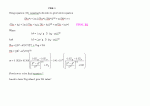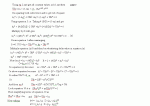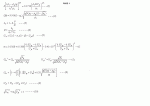Plz help
I have tried to solve the the set of equation many times and also put it on the forum but nobody replied i am putting this up again ..............plz help
its not home work i have to compare my experimental data with model prediction which is that model (set of equations will give me a line) and my data will be lying in near areas or on it or over it to tell me whether thismodel is valid for my work?
Author says that Ubs* and Ufs* in equation 10 are determined by solving simultaneously equation 8, 9 and 2 ; m in equation 1 is obtained from equation 6 by putting Lb, which itself is calculated using equation 4 and 5. Then Ubs* and Ufs* then substituting in equation 1, one can obtain single equation in terms of Usl and Usg. I HAVE DONE THIS SO MANY TIMES THAT I FORGOTTEN THE COUNT!
I have also written to the original author of the model he has not replied!!! I wonder why?
plz help .......... this model has really made me crazy!!!
I have not added the page that shows how got m from equation 4 and 5 as it is simple.
In above Usl and Usg are liquid and gas superficial velocity (m/s) and final equation should come in terms of these variables.
? Ubs* and Ufs* are to be evaluated in terms of Usl and Usg (both unknown).
? delta is the liquid film thickness (unknown).
? epsilon s=0.5 void fraction in liquid slug, dimensionless (known).
? Ls = 12D where D is diameter of pipe & Lb = length of Taylor bubble (unknown)
? D is the diameter of pipe (known) = 0.254m
? g is the acceleration due to gravity = 9.81m/s2
? rho l and rho g are densities of liquid and gas (both known). = 997.04 and 1.23 kg/m3.
? neu l is the absolute viscosity of liquid (known) = 0.0008898 Pa.s
? meu l is the kinematic viscosity of liquid (known) = 8.94E-07 m2/s
PLZZZZZZZZZZZZZZ HELP ME ANY MATHEMATICIAN OUT THERE!!!!
I have tried to solve the the set of equation many times and also put it on the forum but nobody replied i am putting this up again ..............plz help
its not home work i have to compare my experimental data with model prediction which is that model (set of equations will give me a line) and my data will be lying in near areas or on it or over it to tell me whether thismodel is valid for my work?
Author says that Ubs* and Ufs* in equation 10 are determined by solving simultaneously equation 8, 9 and 2 ; m in equation 1 is obtained from equation 6 by putting Lb, which itself is calculated using equation 4 and 5. Then Ubs* and Ufs* then substituting in equation 1, one can obtain single equation in terms of Usl and Usg. I HAVE DONE THIS SO MANY TIMES THAT I FORGOTTEN THE COUNT!
I have also written to the original author of the model he has not replied!!! I wonder why?
plz help .......... this model has really made me crazy!!!
I have not added the page that shows how got m from equation 4 and 5 as it is simple.
In above Usl and Usg are liquid and gas superficial velocity (m/s) and final equation should come in terms of these variables.
? Ubs* and Ufs* are to be evaluated in terms of Usl and Usg (both unknown).
? delta is the liquid film thickness (unknown).
? epsilon s=0.5 void fraction in liquid slug, dimensionless (known).
? Ls = 12D where D is diameter of pipe & Lb = length of Taylor bubble (unknown)
? D is the diameter of pipe (known) = 0.254m
? g is the acceleration due to gravity = 9.81m/s2
? rho l and rho g are densities of liquid and gas (both known). = 997.04 and 1.23 kg/m3.
? neu l is the absolute viscosity of liquid (known) = 0.0008898 Pa.s
? meu l is the kinematic viscosity of liquid (known) = 8.94E-07 m2/s
PLZZZZZZZZZZZZZZ HELP ME ANY MATHEMATICIAN OUT THERE!!!!



